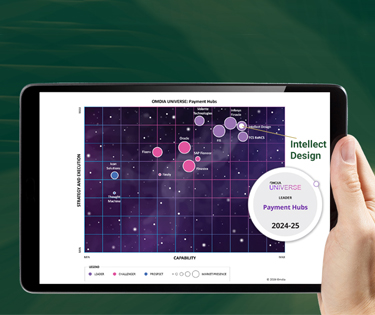- What we do
-
-
-
-
"Intellect’s continued dominance at the IBSi Sales League Table underscores its pioneering role in the fintech industry. Their commitment to innovation, exemplified by the groundbreaking eMACH.ai platform, continues to set a high benchmark in Retail Core Banking, Transaction Banking, and Lending. Intellect’s solutions are not only reshaping the present landscape but are also poised to lead the evolution of financial services globally, driving unprecedented advancements and customer-centric solutions."

Robin Amlôt
Managing Editor at IBS Intelligence
-
-
-
- Company
-
-
-
-
"Intellect’s continued dominance at the IBSi Sales League Table underscores its pioneering role in the fintech industry. Their commitment to innovation, exemplified by the groundbreaking eMACH.ai platform, continues to set a high benchmark in Retail Core Banking, Transaction Banking, and Lending. Intellect’s solutions are not only reshaping the present landscape but are also poised to lead the evolution of financial services globally, driving unprecedented advancements and customer-centric solutions."

Robin Amlôt
Managing Editor at IBS Intelligence
-
-
-
- Knowledge
-
- Our Events
- Contact Us
Your Blueprint to Payment Modernization – Omdia Universe Payments Hub report 2024
Read More News FlashThe Evolution of AI in Trade Finance
Read More News FlashiGTB Pulse Newsletter November 2024
Read More News FlashUAE’s National Bank of Fujairah (NBF) partners with Intellect for its eMACH.ai Cloud for Wholesale Banking on Microsoft Azure
Read Press Release News FlashSaudi Trade Finance Summit 2024
Know More


Driving Sustainable Growth: Navigating the Waters of East African Supply Chain Finance
David Hennah is global head of trade and supply chain finance at iGTB. He previously held an equivalent position at Misys/Finastra. He has 25+ years of experience in Banking and 20+ years of experience in Fintech across senior leadership roles in Banking, Software and Consulting.
David spent 8 years driving supply chain strategy at SWIFT, during which time he became well known for his work in bringing the ICC Bank Payment Obligation (BPO) to market. He was a member of the ICC drafting group on URBPO and is the author of the ICC guide to URBPO. More recently he co-chaired the ICC drafting group on URDTT and is a founding member and former co-chair of the World Trade Board. David is also an expert advisor to the Institute of Banking & Finance.
Supply chain finance (SCF) entails a combination of financing and risk mitigation techniques designed to optimise the management of working capital otherwise trapped in supply chain processes. SCF provides a clear view of trade flows essential for transaction financing. Digitising SCF benefits the whole ecosystem – helping buyers secure inventory, suppliers gain order certainty, and banks facilitate stable transactions. Far from merely stimulating growth, this digital evolution fosters resilience and sustainability in the supply chain.
The rise of open account
A majority of new business entering the market today is conducted on open account. Figure 1 confirms that whilst the documentary trade business is a valuable source of revenue, supply chain finance has the fastest growth rate.
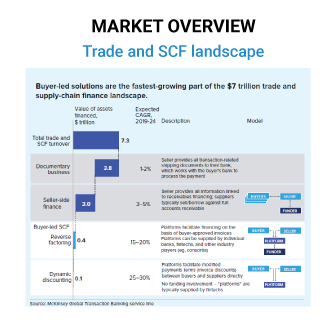
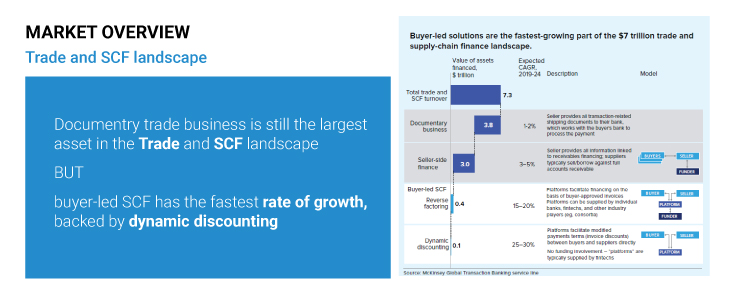
Figure 1: The fastest rate of growth today lies in supply chain finance
Trade finance versus supply chain finance
The table below shows critical differences in accepted variations between traditional trade finance and supply chain finance.
Traditional trade finance involves several banks in the value chain with a relatively high level of intermediation, given the heavy reliance on the manual processing of the underlying documentation routed via the banking system. Usually, only one bank will be involved in a supply chain finance transaction at a relatively low intermediation; the business lending itself naturally to a high degree of digitalisation and straight-through processing. The business process is far less rigid, with no established rules or mandatory use of (e.g. SWIFT) messaging standards.
No.
Business Capabillity
Trade Finance
Supply Chain Finance
1.
Primary Business Application
Risk Mitigation / Payment Assurance (Financing is optional)
Financing
2..
Level of Bank Intermediation
High
Low
3.
No of Banks involved
Many (Issuing Bank, Advising Bank, Confirming Bank, Negotiating Bank, Reimbursing Bank)
One Bank Only (except international factoring in a 2-factor model)
4.
Security
Yes (control over documents/ goods)
No (invoice based)
5.
Recourse
With / without recourse according to contract
Generally, without recourse
6.
Transactional
Singular
Flow-based
7.
Staging
Pre-shipment / Post - Shipment
Mostly Post-Shipment
8.
Regulatory reporting
High
Low
9.
Messaging standards
SWIFT
Various (non-SWIFT)
10.
Additional processing
High (Amendments, Discrepancy handling, etc)
Low
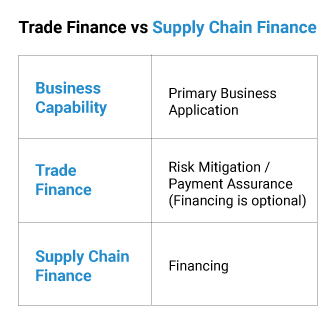
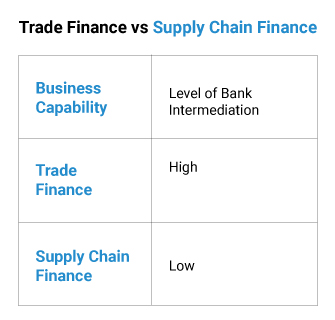
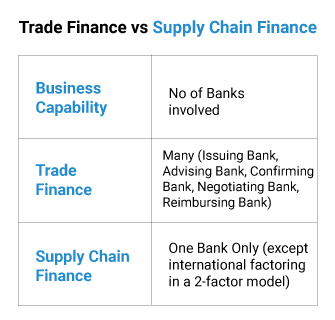
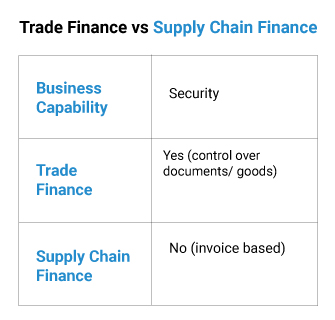
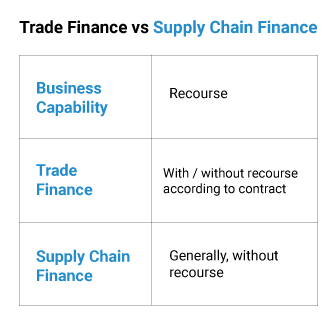
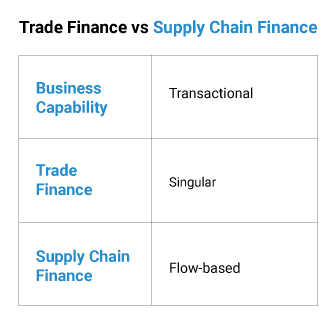
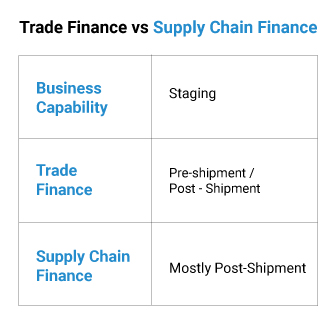
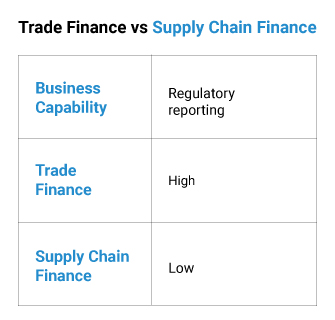
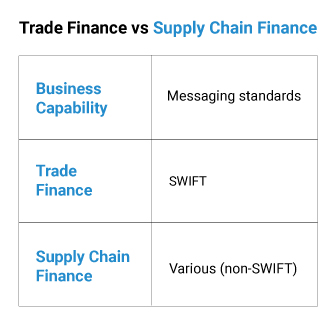
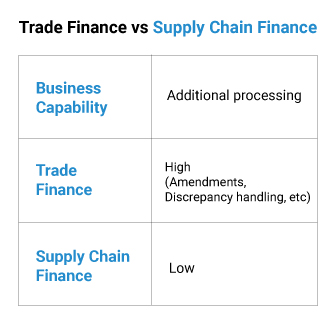
Table1: Trade Finance versus Supply Chain Finance
The Impact of Covid-19
COVID-19 demonstrated the vulnerability of many companies' supply chains and their lack of awareness of the threat of global shocks. Rapid changes in well-established supply and demand patterns can lead to a bullwhip effect—a supply chain whereby inventory demands may suddenly shift. Fortunately, new technologies, including the Internet of Things, artificial intelligence and robotics, can improve end-to-end visibility, breaking down silos and enabling stronger collaboration. Advanced contextual data analytics, using current and historical data, is an essential tool to detect shifts in demand and the likely scenarios that may evolve, thus increasing overall resilience.
Supply Chain Finance in East Africa
Africa, home to 17% of the world's population, accounts for only 1.8% of exports and 2.2% of imports, with intra-regional trade at 15%. Various factors, such as limited access to trade finance, inhibit growth, particularly in East Africa, where trade volumes are lowest. There is vast unlocked potential, and transformational growth can be achieved by accelerating trade in goods and services within the continent and between Africa and world markets.
On successive visits to East Africa in 2022 and 2023, one distinctive impression is the emphasis towards the potential of leveraging supply chain finance techniques, comprising both receivables purchase solutions and loan-based solutions, to close the trade finance funding gap. In East Africa, SMEs create 80% of employment but are starved of working capital, with 80% unable to achieve growth potential. Digitalisation in supply chain finance, including receivables purchase and loan-based solutions, is vital to foster resilience and agility, unlocking the vast potential for transformational growth in trade within the continent and globally.
The iColumbus.ai SCF toolkit

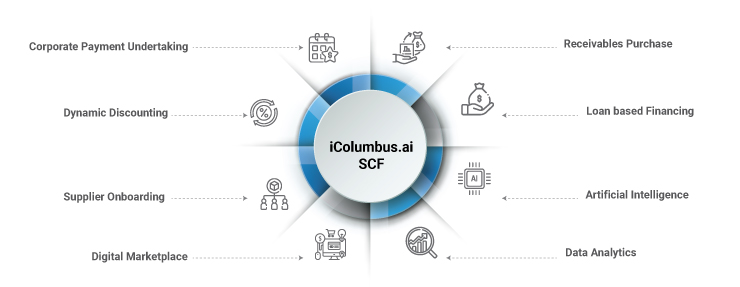
Figure 2: The iColumbus.ai SCF toolkit
Receivables Purchase
iColumbus.ai delivers a comprehensive range of business modules across Payables Finance, Receivables Discounting and Factoring.
Loan-based financing
iColumbus.ai delivers a comprehensive range of business modules across Pre-Shipment Finance, Distributor Finance and Loans against Receivables.
Artificial intelligence
We can make complex tasks like document processing more efficient by embracing AI technologies like machine learning. Embracing machine learning and natural language processing techniques will automate complex cognitive processes associated with due diligence. Its application will eventually benefit multiple aspects of international trade, including the more efficient management of supply chains, contracts and regulatory compliance, ultimately opening up new opportunities for easier access to finance.
Data Analytics
In the world of supply chains, leaders often grapple with information overload. Analytical tools and data analytics act as guiding hands, helping businesses and banks navigate risks and relationships and effectively manage revenues.
Digital Marketplace
iColumbus.ai supports out-of-the-box open banking-based standard REST APIs, enabling banks to place themselves at the centre of the trade ecosystem supporting corporate clients, using an open architecture that promotes collaboration with technology platforms, government agencies and other third-party service providers.
Supplier onboarding
One of the biggest challenges of setting up new supplier relationships is the onboarding process, often calling for gathering data from multiple sources and multiple sequential approvals; automated, data-driven processing will optimise collaboration and transparency and ultimately reduce the risk and the red tape.
Dynamic discounting
Approved Payables programs often include a dynamic discounting option, under which a supplier can obtain an early payment directly from the buyer. The discount value varies according to the point in the transaction lifecycle when the discount is applied. This arrangement gives buyers a relatively strong cash position with an attractive option to pay early.
Corporate Payment Undertakings
Corporate Payment undertakings represent a deviating understanding of Payables Finance whereby the buyer sends a payment instruction to the Finance Provider, and the seller will receive an advanced (or early) payment. The deviation results from the fact that unlike in a Payables Finance scenario, the Finance Provider will not purchase the underlying receivable from the seller but fully rely on an irrevocable payment undertaking from the buyer.
Conclusion
Despite Supply Chain Finance gaining popularity in the past 20 years, its adoption in emerging markets remains relatively low.
Through digitalisation of banking processes, adopting supply chain finance can significantly increase access to working capital for SMEs most in need. This mainly benefits companies engaged in the manufacturing and agricultural sectors.
With the East African economy leaning towards adopting e-commerce techniques and practices, Banks are leveraging this opportunity. The time is ripe for lending support by offering an integrated approach across multiple supply chains. The deployment of state-of-the-art digital technologies, such as iColumbus.ai, will enable workflow automation and risk mitigation supported by advanced data analytics, business intelligence and the extended use of artificial intelligence through machine learning and natural language processing.
The future of banking is here.
David Hennah is global head of trade and supply chain finance at iGTB. He previously held an equivalent position at Misys/Finastra. He has 25+ years of experience in Banking and 20+ years of experience in Fintech across senior leadership roles in Banking, Software and Consulting.
David spent 8 years driving supply chain strategy at SWIFT, during which time he became well known for his work in bringing the ICC Bank Payment Obligation (BPO) to market. He was a member of the ICC drafting group on URBPO and is the author of the ICC guide to URBPO. More recently he co-chaired the ICC drafting group on URDTT and is a founding member and former co-chair of the World Trade Board. David is also an expert advisor to the Institute of Banking & Finance.



























